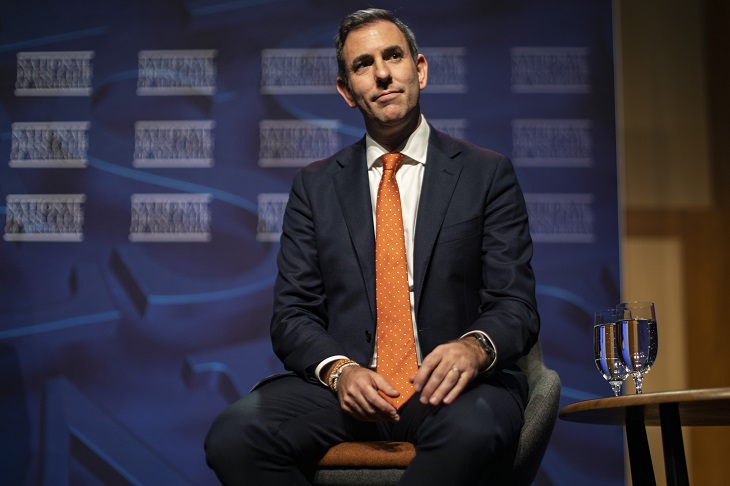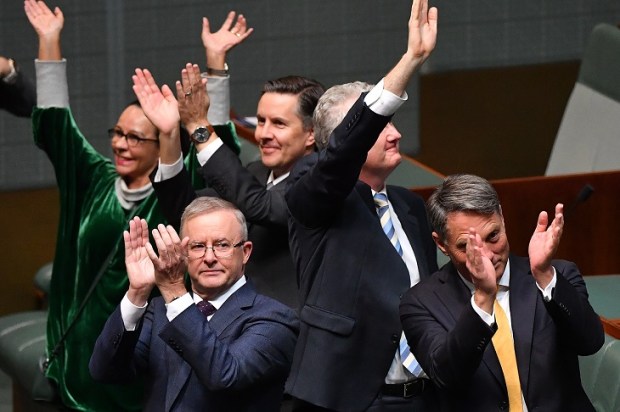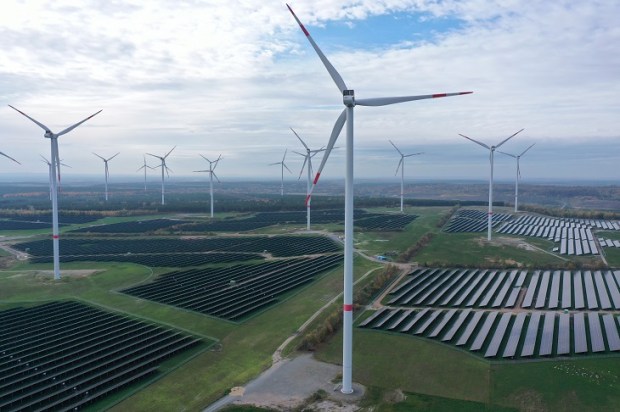Jim Chalmers is proving to be the most iconoclastic Treasurer since the Whitlam government’s Jim Cairns, a man who only joined the Labor Party after his application to join the Communist Party was rejected. Cairns spearheaded a previous assault on conventional capitalist economic theory and, like Chalmers, sought to borrow, spend, and regulate the nation into prosperity with fairness. Both Chalmers and Cairns came into politics with doctorates in economic history – that of Chalmers was a hagiography of Paul Keating, whose policies he now wants to reverse.
Like Cairns, Chalmers faced a budget crisis but was unable or unwilling to make the expenditure reductions necessary to rectify this. Modernising Cairns, Chalmers wants to ‘do better than just batten down the hatches in 2023 or hope for the best’. He says his pro-active approach relies on, ‘…an orderly energy and climate transition, with implications for living costs, employment, where and how we live, the commercialisation of technology, and the trajectory of our economic development.’
Within that word salad are the euphemisms: ‘implications for living costs’ and ‘trajectory of our economic development’. Surely by these he means the intensified hydrocarbon-bashing energy policy he favours will increase living costs but why does he not say this clearly?
He sees, and welcomes, a total reformulation by his government in the way we live, ‘in the face of climate, geopolitical and cyber risks, unreliable supply chains, and pressures on budgets from an ageing population’ and therefore wants ‘a more resilient and adaptable economy’ with ‘growth that puts equality and equal opportunity at the centre’.
Governments in the un-lamented Soviet Bloc transformed the rule of law into rule by law. They justified this sacrifice of some liberties on the basis that it was necessary to achieve the Workers’ Paradise.
Jim Chalmers wants to replace naturally evolved markets, where individuals’ decisions drive outcomes, with collective decisions of business governments, unions, and community groups using newly forged markets to deliver the outcomes. If all this sounds like socialism and its near cousin, fascism, it is because that’s what it is.
Chalmers wants to replace the rule of law and property rights that allows trillions of individual market-based decisions to determine the expenditures, savings, and investment patterns in ways that optimise present and future consumption levels. He does so out of a general frustration that a market system undirected by political elites is not delivering the outcomes he prefers to see.
Superimposed on this is a recognition, shared by most of the widely defined political class, that conventional markets will not deliver an ‘orderly energy and climate transition’ through renewables. In this Chalmers is right – even the legacy of some $7 billion a year spent on shifting energy supplies from coal to renewables is proving insufficient for the task and additional measures are being introduced. These include new purchasing preferences for renewables, subsidies to renewables energy transmission, and a new carbon tax called the ‘Safeguard Mechanism’ requiring the top 215 facilities to reduce their emissions by 30 per cent by 2030.
Like the Holy Grail of the Workers’ Paradise that drove earlier generations of radicals favouring reformulated market processes, the goals of the ‘energy transition’ – the elimination of greenhouse gas emissions – cannot come about by market forces based on individuals exercising their own preferences.
The costs of restructuring modern economies are already and evidently far in excess of whatever trivial gains may be made from carbon dioxide emission reductions. Energy costs are skyrocketing with politicians searching for someone to blame – Russians, greedy miners – anyone but themselves will do. Political actors have drunk the same Kool-Aid that has persuaded much of the voting public that renewable energy is the future and replacing coal oil and gas will be achieved with, at worst, modest costs. For politicians – and indeed the business people and celebrities attending talkathons like Davos – driving history is far more exciting than simply observing it.
Dr Chalmers is not alone among those in politics and the bureaucracy who invert the economics template that has driven the growth of living standards this past 300 years. But the radical transformation of the economy using collectivised decisions on investment and spending is a recipe for stagnation, corruption, and eventually political tyranny. It is no coincidence that those systems that have sought to replace market outcomes by collectivist or top-down decisions on supply and investment have reaped such a dismal harvest.
Got something to add? Join the discussion and comment below.
Get 10 issues for just $10
Subscribe to The Spectator Australia today for the next 10 magazine issues, plus full online access, for just $10.


























Comments
Don't miss out
Join the conversation with other Spectator Australia readers. Subscribe to leave a comment.
SUBSCRIBEAlready a subscriber? Log in